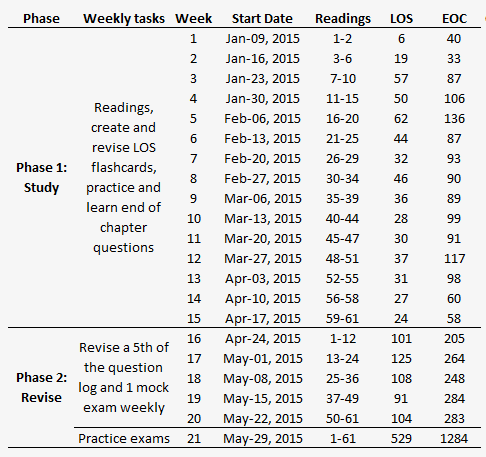So how was week 4? Did you manage to work your way through all the end of chapter questions until you could confidently answer them all? If so, you are in a good place. You have mastered more than 25% of the exam curriculum already, and we are just getting started. Please record your week 4 progress here, so I can keep you accountable if lagging behind the schedule, or congratulate you for keeping up.
The week to come:
Unfortunately there is no time to rest on your laurels when studying for the CFA® exam. The upcoming 2 weeks we are going to cover more Economics. This topic area is slightly tricky, in that it is the topic area with the lowest anticipated exam weight compared to its size in the curriculum. As a result you will be whipping through a lot of pages, but it will not have a great influence on your final exam score. To be specific Economics takes up roughly 17.5% of the pages in the curriculum, but is estimated to only count for roughly 10% of the final exam score.
Purchasing an abbreviated study guide is not a strict requirement in order to pass the exam (although it is likely a positive for most time-strapped candidates). But in case you did purchase one (we recommend the Wiley CFA Exam Review Products), this topic area is probably the best suited area of the curriculum. The study notes will provide an abbreviated version of the readings, saving you valuable time by emphasizing what the study note provider considers most exam relevant. A set of study notes is by no means a prerequisite to pass the test though, at the end of the day you are going to be tested on what is in the curriculum, and if you go by the LOS you should be able to focus your attention on the most important passages, it will just take a bit more time.
Let’s recap where we are at in the program:

Source: Financial Exam Academy (Based on the CFA® exam – level 1 curriculum – June 2016 Exam)
With this in mind we are going to attack 5 more Economics readings this week! This includes the last reading in the microeconomics study session, the entire macroeconomics study session and the first reading in economics in a global context. At roughly 300 pages (in the printed curriculum books) this is the largest weekly effort in terms of page numbers in the entire study program. My best advice would be to employ the same approach that we have used the first four weeks, but with an even firmer focus on seeking out the LOS rather than mind-numbingly reading through every page. Your key success criteria for the week remain the following:
- Write down the LOS on flash cards so that you have them handy, and actively seek out and write down the answers on the flip side (with the book-, reading-, LOS- and page number) as you progress through each individual reading (It is crucial that you manage to focus on only what is important in this reading). Also as you progress through the reading write down any key concepts or formulas that you come across on individual flash cards framed as a question, write the answer, book-, reading-, LOS- and page number on the flipside of the flashcards (for future reference). You can apply this same approach irrespective if you are studying in the curriculum or an abbreviated study guide. Review the flashcards the following day and make a note of those that still challenge you in your question log.
- Attempt all of the end of chapter questions once you have completed each reading (There are 136 end of chapter questions in the 5 readings, this should take about 3 hours in total). As you answer the questions make a note of those that challenge you the most in your question log (especially if you need to guess the answer). Review your answers thoroughly and add the questions that you got wrong to the question log. You will now have a complete list of the toughest questions in the reading seen from your perspective.
- The following day, after you have completed the above tasks for each reading, attempt only the flashcards and EOC questions from your question log. Revise your answers and make a note of any flashcards/questions you are still struggling with. Repeat this very same process for as many days as required until you have mastered all. (thankfully we are back to standard multiple choice questions in these readings, which should make the marking easier). Make sure you revise the answers to really understand the reason behind each answer.
As mentioned, if you do own a set of study notes then this topic area is probably the best suited area of the curriculum (if you trust the provider) as the study notes will provide an abbreviated version of the readings (saving you valuable time by emphasizing, what the study note provider considers most exam relevant). A set of study notes is by no means a prerequisite to pass the test though, at the end of the day you are going to be tested on what is in the curriculum, and if you go by the LOS you should be able to focus your attention on the most important passages.
Please fill in your weekly progress report. I don’t have to remind you about this anymore, do I? And let’s touch base next weekend, when you will be nearly done with Economics.
In week 6 we are completing Economics and moving into Financial Reporting and Analysis.
